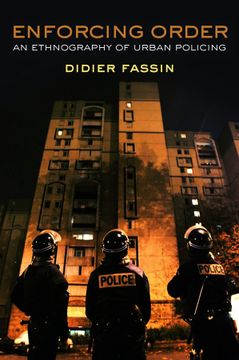Compartir
Enforcing Order: An Ethnography Of Urban Policing
Didier Fassin (Autor)
·
Polity
· Cloth
Enforcing Order: An Ethnography Of Urban Policing - Didier Fassin
83,36 €
87,74 €
Ahorras: 4,39 €
Elige la lista en la que quieres agregar tu producto o crea una nueva lista
✓ Producto agregado correctamente a la lista de deseos.
Ir a Mis Listas
Origen: Reino Unido
(Costos de importación incluídos en el precio)
Se enviará desde nuestra bodega entre el
Viernes 17 de Mayo y el
Jueves 30 de Mayo.
Lo recibirás en cualquier lugar de España entre 1 y 5 días hábiles luego del envío.
Reseña del libro "Enforcing Order: An Ethnography Of Urban Policing"
Acknowledgementspreliminary Remarkspreface To The Engish Editionprologue - Interpellationin Which The Author Comes To Understand That It Is Sometimes Dangerous To Wait For A Bus In The Outer City On New Years Eve. How Policing Practice Provides The Language For A Philosophical Theory, And How A Philosophical Theory Supplies The Meaning Of Policing Practice. That This Is Not A Testimony, And That Indignation Is Not Rage. Introduction - Inquiryhow The Present Research Was Authorized And Then Forbidden, And That This Censorship Is Revelatory Of Petty Exceptions In A Democratic Regime. That An Ethnography Of The Police Requires Resisting The Dual Temptation Of Exoticism And Culturalism. That A Study Is Often The Result Of The Converging Effects Of Chance And Necessity. Chapter 1 - Situationhow An Imaginary Of War Came To Be Established In The Relations Between The Police And The Projects. That A Brief History Of The Social Question And Security Issues Is Essential In Order To Understand The Context In Which Law Enforcement Faces Classes Reputed To Be Dangerous. That The Creation Of More Aggressive Special Units Was Judged Necessary To Deal With The Alleged Disorder In The Outer Cities. Chapter 2 - Ordinaryhow The Daily Work Of Police Officers Is Far Removed From The Image They Had Of It When They Joined The Force, And The Illusion They Continue To Maintain Of It. That Evaluation Of The Work Of Urban Patrols Yields Such Unexpected Results That It Is Not Taken Into Account By Government. That Inaction Generates Action, And What This Phenomenon Of Spontaneous Generation Means For The Residents Of The Projects. Chapter 3 - Interactionshow Stops And Frisks Serve Purposes Other Than Those They Are Supposed To Serve, And Prove More Effective In Perpetuating A Social Order Than In Maintaining Public Order. That The Way Police Officers Speak About The Individuals With Whom They Deal Throws Light On Their Way Of Operating In The Outer Cities. That The Theater Of Police Intervention Sometimes Plays Comedies In Which Not All Spectators Laugh At The Same Moment. Chapter 4 - Violencehow A Criminal Court Can Offer Valuable Lessons On Excessive Use Of Force By The Police In The Outer Cities. That By Not Reducing Violence To Its Physical Aspect And Not Limiting The Definition Of It To The Legal Sense, One Can Gain A Different Understanding Of It. That There Are Many Ways Of Preventing Police Brutality From Being Prosecutedchapter 5 - Discriminationhow Police Officers And Sociologists Challenge The Existence Of Discriminatory Practices That The Rest Of The French Population Is Convinced Prevail. That Racist Ideas Do Not Automatically Lead To Discriminatory Practices, But That The Two Are Far From Incompatible. That Institutions Show More Tolerance Toward Institutional Racism Than Toward Its Victims. Chapter 6 - Politicshow Some Signs Are Not Deceiving, But Maynevertheless Be Surprising In A Democratic Regime. That Local Practices Enjoy Great Autonomy With Respect To National Guidelines, But That Government Policy Has Some Influence On The Everyday Work Of Law Enforcement. That The Corollary Of The Increasing Criminalization Of Behaviors Is An Unprecedented Casting Of The Police As Victims. Chapter 7 - Moralityhow Police Officers Disappointed By The Justice Of The Courts Began To Practice Street Justice. That Jokes In The Precinct Can Prove More Serious Than Is Customarily Maintained. That A Code Of Ethics Is Not Enough To Interpret The Ethical Forces At Work In The Behavior Of Police Officers And The Moral Impasse In Which The Police Find Themselves. Conclusion - Democracyhow The French Police Preferred The Model Of The Cop In The United States To The Style Of The British Bobby, And What Was The Result. That The Imposition Of The Rationale Of Security Has A High Social Cost For Contemporary Societies. That The Interests Of Ethnography Are Intimately Bound With Those Of Democracy. Epilogue - Timein Which The Author Looks Back To A Not - So - Distant Past, Observes That The More Things Change The More They Do Not Stay The Same, Wonders About The Present As It Is Experienced By Certain Segments Of French Society And Ignored By The Others, And Expresses Concerns About The Future. Notesbibliography
- 0% (0)
- 0% (0)
- 0% (0)
- 0% (0)
- 0% (0)
Todos los libros de nuestro catálogo son Originales.
La encuadernación de esta edición es Cloth.
✓ Producto agregado correctamente al carro, Ir a Pagar.

